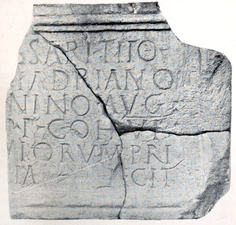Cohors VI Nerviorum
The Cohors VI Nerviorum (English: Sixth Cohort of Nervii) was an auxiliary unit of Roman Army Cohors quinquagenaria peditata type attested in the Roman province of Britannia from the second century to the early fifth century AD.[1]
Service in Britannia
The cohort was based at Greatchesters fort on Hadrian's Wall from the second to the fourth century AD.[4] Inscriptions found at the Antonine Wall in Scotland state that 480 men of the Cohors VI Nerviorum served at Rough Castle Fort between 156-162AD.[5] One of its commanders was a centurion named Flavius Betto.[6]
The cohort also rebuilt part of the Virosidum fort in present North Yorkshire around 205-208AD.[7]
gollark: Highly apiaristic form?
gollark: ?tag edit "lyricly projects" At least mindbreak & macron + possibly chess world. Will never be finished.
gollark: ?tag lyricly projects
gollark: ?tag lyric projects
gollark: I should update the projects.
References
- Anthony Richard Birley (1980). The People of Roman Britain. University of California Press. pp. 61–. ISBN 978-0-520-04119-6.
- "RIB 2145. Dedication to Emperor Antoninus Pius". Roman Inscriptions of Britain. Retrieved 18 November 2017.
- Macdonald, Sir George (1934). The Roman wall in Scotland, by Sir George Macdonald (2d ed., rev., enl., and in great part rewritten ed.). Oxford: The Clarendon press. p. 228. Retrieved 11 October 2017.
- Hadrian's Wall AD 122-410. Osprey Publishing. 2003. pp. 42–. ISBN 978-1-84176-430-6.
- "2530 ‒ Cohors VI Nerviorum". The Roman Inscriptions of Britain. Retrieved 12 April 2015.
- "4092 ‒ Flavius Betto". The Roman Inscriptions of Britain. Retrieved 12 April 2015.
- "RIB 722. Inscription". The Roman Inscriptions of Britain. Retrieved 12 April 2015.
For the Emperor Caesar Lucius Septimius Severus Pius Pertinax Augustus and for the Emperor Caesar Marcus Aurelius Antoninus Pius Felix Augustus and for Publius Septimius Geta, most noble Caesar, the Sixth Cohort of Nervians built this [rampart] of uncoursed masonry with annexe-wall under the charge of Lucius Alfenus Senecio, senator of consular rank; Lucius Vinicius Pius, prefect of the same cohort …, had direction of the work.
This article is issued from Wikipedia. The text is licensed under Creative Commons - Attribution - Sharealike. Additional terms may apply for the media files.
